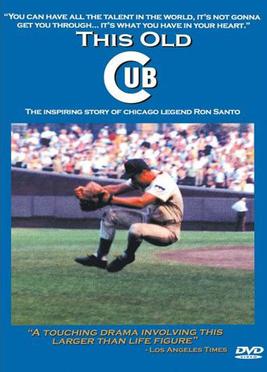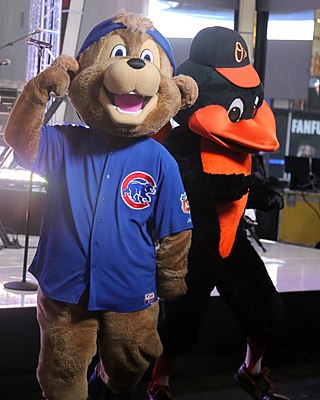
The Chicago Cubs are an American professional baseball team based in Chicago. The Cubs compete in Major League Baseball (MLB) as a member club of the National League (NL) Central Division. The club plays its home games at Wrigley Field, which is located on Chicago's North Side. They are one of two major league teams based in Chicago, alongside the American League (AL)’s Chicago White Sox. The Cubs, first known as the White Stockings, were a founding member of the NL in 1876, becoming the Chicago Cubs in 1903.

Wrigley Field is a ballpark on the North Side of Chicago, Illinois. It is the home ballpark of Major League Baseball's Chicago Cubs, one of the city's two MLB franchises. It first opened in 1914 as Weeghman Park for Charles Weeghman's Chicago Whales of the Federal League, which folded after the 1915 baseball season. The Cubs played their first home game at the park on April 20, 1916, defeating the Cincinnati Reds 7–6 in 11 innings. Chewing gum magnate William Wrigley Jr. of the Wrigley Company acquired the Cubs in 1921. It was named Cubs Park from 1920 to 1926, before being renamed Wrigley Field in 1927. The stadium currently seats 41,649 people and is the second stadium to be named Wrigley Field, as a Los Angeles ballpark with the same name opened in 1925.

Steven Benjamin Goodman was an American folk and country singer-songwriter from Chicago. He wrote the song "City of New Orleans", which was recorded by artists including Arlo Guthrie, John Denver, The Highwaymen, and Judy Collins. In 1985, Goodman received the Grammy songwriter award for best country song. Goodman co-wrote "You Never Even Called Me by My Name", which became the best-selling song of country musician David Allen Coe. A lifelong Chicago Cubs fan, Goodman wrote "Go Cubs Go." Goodman died of leukemia in September 1984.

Harry Christopher Caray was an American radio and television sportscaster. During his career he called the play-by-play for five Major League Baseball teams, beginning with 25 years of calling the games of the St. Louis Cardinals. After a year working for the Oakland Athletics and 11 years with the Chicago White Sox, Caray spent the last 16 years of his career as the announcer for the Chicago Cubs.

Ernest Banks, nicknamed "Mr. Cub" and "Mr. Sunshine", was an American professional baseball player who starred in Major League Baseball (MLB) as a shortstop and first baseman for the Chicago Cubs between 1953 and 1971. He was inducted into the National Baseball Hall of Fame in 1977 in his first year of eligibility, and was named to the Major League Baseball All-Century Team in 1999.

The Cubs–White Sox rivalry refers to the Major League Baseball (MLB) geographical rivalry between the Chicago Cubs and Chicago White Sox. The Cubs are a member club of MLB's National League (NL) Central division, and play their home games at Wrigley Field, located on Chicago's North Side. The White Sox are a member club of MLB's American League (AL) Central division, and play their home games at Guaranteed Rate Field, located on Chicago's South Side.

John Beasley Brickhouse was an American sportscaster. Known primarily for his play-by-play coverage of Chicago Cubs games on WGN-TV from 1948 to 1981, he received the Ford C. Frick Award from the Baseball Hall of Fame in 1983. In 1985, Brickhouse was inducted into the American Sportscasters Association Hall of Fame along with the Voice of the Yankees Mel Allen and Red Sox Voice Curt Gowdy. Brickhouse served as the organization's Secretary/Treasurer and was a member of its board of directors.

Charles John Grimm, nicknamed "Jolly Cholly", was an American professional baseball player and manager. He played in Major League Baseball as a first baseman, most notably for the Chicago Cubs; he was also a sometime radio sports commentator, and a popular goodwill ambassador for baseball. He played for the Pittsburgh Pirates early in his career, but was traded to the Cubs in 1925 and worked mostly for the Cubs for the rest of his career. Born in St. Louis, Missouri, to parents of German extraction, Grimm was known for being outgoing and chatty, even singing old-fashioned songs while accompanying himself on a left-handed banjo. Grimm is one of a select few to have played and managed in 2,000 games each.

Milton Steven Pappas was an American professional baseball player. He played in Major League Baseball as a right-handed pitcher from 1957 through 1973. Nicknamed "Gimpy", the 17-year veteran pitched for the Baltimore Orioles (1957–1965), Cincinnati Reds (1966–1968), Atlanta Braves (1968–1970) and Chicago Cubs (1970–1973). A control specialist, Pappas pitched in 520 games, starting 465, with 209 wins, 164 losses, 43 shutouts, 1,728 strikeouts and a 3.40 ERA in 3,186 innings pitched. He was a three-time All-Star player for the Orioles and was inducted into the Baltimore Orioles Hall of Fame in 1985. He was also a member of the 1960's Baltimore Orioles Kiddie Korps.

Jerry Pritikin is a lifelong Chicago Cubs fan known as the Bleacher Preacher.

Yosh Kawano was an American clubhouse manager for the Chicago Cubs baseball team who retired in 2008 and was known for his trademark white fishing hat. Kawano's long service and dedication to the team made him a part of Chicago Cubs team lore. A member of the Chicago Cubs Hall of Fame, he is honored by a plaque in the concourse of Wrigley Field.

The following is a franchise history of the Chicago Cubs of Major League Baseball, a charter member of the National League who started play in the National Association in 1870 as the Chicago White Stockings. The Chicago National League Ball Club is the only franchise to play continuously in the same city since the formation of the National League in 1876. They are the earliest formed active professional sports club in North America, predating the team now known as the Atlanta Braves by one year. In their early history, they were called in the press the White Stockings, Orphans, Infants, Remnants and Colts before officially becoming "Cubs" in 1907.

The 1984 Chicago Cubs season was the 113th season of the Chicago Cubs franchise, the 109th in the National League and the 69th at Wrigley Field. The Cubs finished with a record of 96 wins and 65 losses in first place of the National League East. Chicago was managed by Jim Frey and the general manager was Dallas Green. The Cubs' postseason appearance in this season was their first since 1945. The Cubs pitching staff included 1984 Cy Young Award winner Rick Sutcliffe, and the lineup included 1984 Baseball Most Valuable Player Award winner second baseman Ryne Sandberg. Frey was awarded Manager of the Year for the National League for leading the Cubs to 96 victories. The Cubs were defeated in the 1984 National League Championship Series by the San Diego Padres three games to two.

This Old Cub is a 2004 documentary film. The film is centered on former Chicago Cubs third baseman Ron Santo and both his playing days and his battle against diabetes. The film was written, co-produced, and directed by Santo's son Jeff. It is often mentioned during Cub game broadcasts by Pat Hughes, who was Santo's partner in the WGN Radio booth. The film was a gift from Jeff to his father as a part of the "Ron Santo Day" celebration that season after Santo had both his legs amputated and had just missed induction into the MLB Hall of Fame a few months earlier. A portion of all proceeds from the release of This Old Cub are donated to the Juvenile Diabetes Research Foundation. The film has raised over a half-million dollars for the JDRF. Cub first baseman Ernie Banks, Gary Sinise, Bill Murray, former Chicago Bears linebacker Doug Buffone, and many others are interviewed in the film, which is narrated by actor Joe Mantegna.

The 2008 Chicago Cubs season was the 137th season of the Chicago Cubs franchise, the 133rd in the National League and the 93rd at Wrigley Field. The season began at home on March 31 against the Milwaukee Brewers. The Cubs were champions of the National League Central for the second year in a row, accumulating 97 regular season wins—the most since 1945. It was the first time since 1908 that the Cubs made postseason appearances in consecutive seasons.

The 1998 Chicago Cubs season was the 127th season of the Chicago Cubs franchise, the 123rd in the National League and the 83rd at Wrigley Field. The Cubs finished second in the National League Central with a record of 90–73.

"All the Way" is a song written and performed by Evanston, Illinois native and Pearl Jam vocalist Eddie Vedder about the Chicago Cubs. It was first performed in public on August 2, 2007, recorded on August 21, 2008 and August 22, 2008, and released as a single on September 18, 2008.

"Go Cubs Go", "Go, Cubs, Go" or "Go, Cubs, Go!" is a song written by Steve Goodman in 1984. At various times the Goodman version of the song has been the official Chicago Cubs team song and the official Cubs victory song, playing after every home win for the Cubs at Wrigley Field. The Goodman version has been included in both a 1994 Steve Goodman anthology album and a 2008 Cubs songs and sounds album. Following the team's 2016 World Series victory, the song peaked at number 3 on Billboard's Bubbling Under Hot 100 Singles chart. An alternate 2008 version by Manic Sewing Circle has also been released.

Clark is the official team mascot of Major League Baseball's Chicago Cubs. He was announced on January 13, 2014, as the first official mascot in the modern history of the Cubs franchise. He was introduced that day at the Advocate Illinois Masonic Medical Center's pediatric developmental center along with some of the Cubs' top prospects such as number one draft pick Kris Bryant and Albert Almora, Jorge Soler, Mike Olt and Eric Jokisch. Over a dozen Cubs prospects were attending the Cubs' Rookie Development Program that week. The Cubs become the 27th team in Major League Baseball to have a mascot, leaving the Los Angeles Angels, Los Angeles Dodgers and New York Yankees as the remaining franchises without mascots. According to the Cubs' press release, Clark is a response to fan demands for more kid-friendly elements at Wrigley Field Cubs games to keep pace with games in other cities that have more to offer youth fans.

















